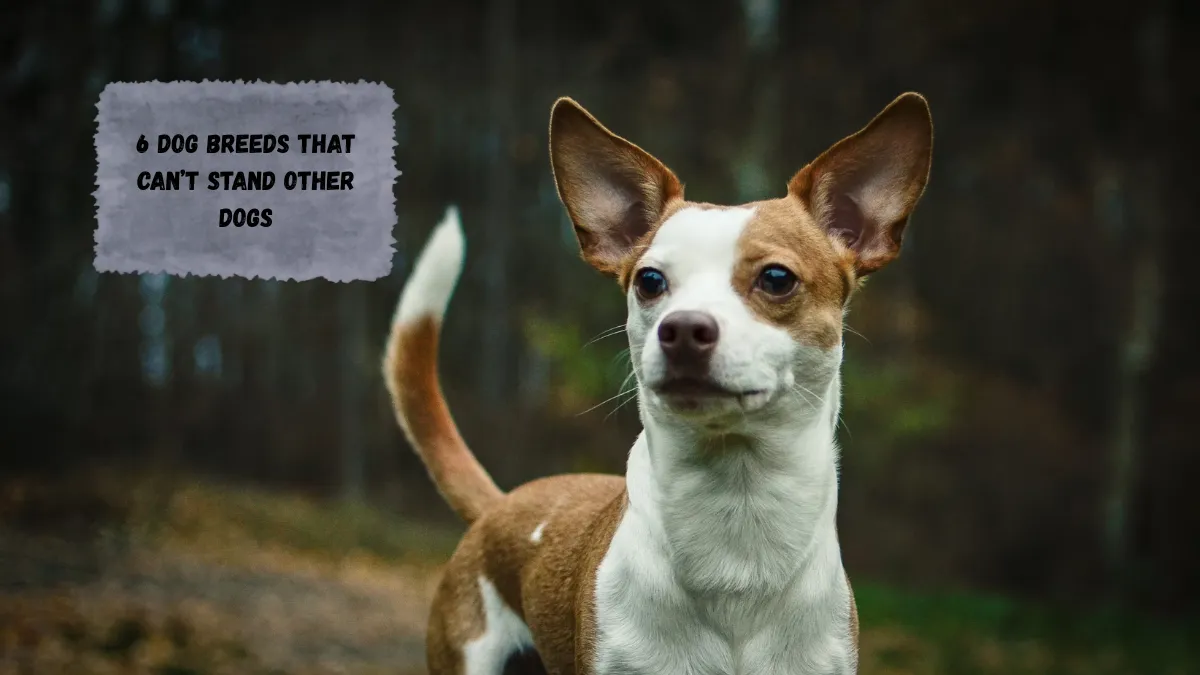When it comes to dogs, every breed has its own unique personality traits and social preferences. While many dogs enjoy playing and living peacefully with other canine companions, some breeds are known for their intolerance toward other dogs. Understanding which breeds tend to be less sociable with their furry counterparts can help potential dog owners make informed decisions and better manage their pets.
In this article, we explore six dog breeds that can’t stand other dogs, including the feisty Chihuahua and the proud Akita. Whether it’s due to territorial instincts, high prey drive, or strong dominance tendencies, these breeds often prefer to be the only dog around. If you’re considering one of these breeds or already own one, learning about their behavior around other dogs is essential for creating a harmonious environment and ensuring everyone’s safety.
6. Shiba Inu
Shiba Inus are small but spirited dogs known for their bold and independent nature. While they can be affectionate with their families, they often display a strong sense of territoriality and suspicion toward unfamiliar dogs. This breed tends to have a high prey drive and can be quite reactive when encountering other dogs, especially those they don’t know well.
Socialization from a young age is crucial for Shiba Inus to help moderate their aggressive tendencies, but many still maintain a natural wariness that can lead to conflicts. Their strong-willed personality means they might challenge other dogs, making them less compatible with multi-dog households unless carefully managed.
5. Jack Russell Terrier
Jack Russell Terriers are energetic and fearless dogs bred originally for hunting foxes. This breed has a high prey drive and an assertive nature that often translates into poor tolerance for other dogs. Jack Russells can be very territorial and dominant, and their persistent energy can lead to aggressive or overly competitive behavior during interactions with other canines.
They require early socialization and firm training to help control these tendencies, but even then, they may still struggle to get along with other dogs, especially those of the same sex. Their bold personality makes them prone to confrontations, which can be challenging for owners managing multiple pets.
4. Chow Chow
Chow Chows are known for their dignified and aloof demeanor, and they often prefer to be the only dog in the household. This breed has a strong territorial instinct and can be very protective of their space and family members. Chow Chows are naturally suspicious of strangers, including other dogs, which can cause them to react aggressively in social situations.
Their stubbornness and independence make training and socialization challenging, and if not managed correctly, this can increase the likelihood of conflicts with other dogs. They tend to assert dominance and may not tolerate other dogs well, especially those that challenge their authority or invade their territory.
3. Dachshund
Dachshunds are small dogs with surprisingly big personalities. They are known to be stubborn and fearless, often acting as if they are much larger than their size. This breed has a strong prey drive and can be territorial, making them less tolerant of other dogs.
Dachshunds often display defensive aggression when they feel threatened or challenged by other dogs, and their boldness means they may initiate confrontations even with larger dogs. Early socialization and training are essential to curb these tendencies, but many Dachshunds still struggle to coexist peacefully with other canines, particularly in close quarters or when resources like food and toys are involved.
2. Akita
Akitas are large, powerful dogs with a proud and protective nature. They are known for their loyalty and can be very reserved around strangers, including unfamiliar dogs. This breed often exhibits strong dominance instincts and territorial behavior, which can result in aggressive encounters with other dogs, especially those of the same sex.
Akitas require careful socialization and training from an early age to manage their natural guarding instincts, but even then, they may remain intolerant toward other dogs. Their size and strength can make these conflicts serious, so owners must be vigilant in monitoring interactions to prevent fights.
1. Chihuahua
Despite their small size, Chihuahuas have big personalities and are often described as feisty and confident. They can be very protective of their owners and personal space, which leads to a strong dislike of other dogs invading their territory. This breed often exhibits defensive aggression and can be surprisingly hostile toward unfamiliar dogs, especially larger breeds.
Their nervous energy and high alertness make them prone to barking and snapping during encounters with other canines. Proper socialization is essential, but many Chihuahuas still struggle to tolerate other dogs and may show aggressive behavior to defend themselves or their home environment.
Bottom Line
Certain dog breeds naturally show less tolerance toward other dogs due to their instincts and personalities. Breeds like the Shiba Inu, Jack Russell Terrier, and Chow Chow often prefer solitude or limited canine interaction, which requires owners to be mindful and proactive in socializing and training them early.
Understanding these breed tendencies helps prevent conflicts and ensures a safe and comfortable environment for your dog and others. With the right approach, even dogs that are less sociable can coexist peacefully in multi-dog homes or social settings.
FAQs
Q1: Why do some dog breeds dislike other dogs?
Some breeds have strong territorial instincts, high prey drives, or dominant personalities that make them less tolerant of other dogs.
Q2: Can these breeds be trained to get along with other dogs?
Yes, early socialization and consistent training can improve their behavior, but some breeds may always prefer limited interactions.
Q3: Are these dogs aggressive toward all dogs or only unfamiliar ones?
Often, these breeds are more aggressive or defensive toward unfamiliar dogs, while they may tolerate dogs they know well.
Q4: Should I avoid adopting these breeds if I have other dogs?
Not necessarily, but it’s important to assess your current dogs’ temperaments and be prepared for careful introductions and management.
